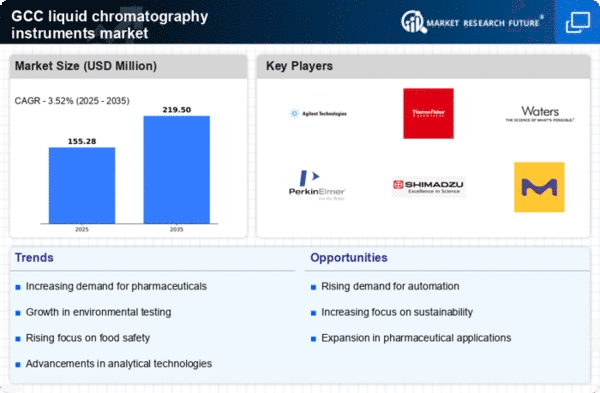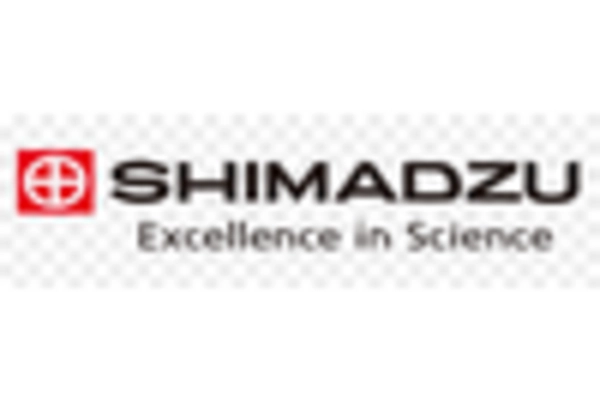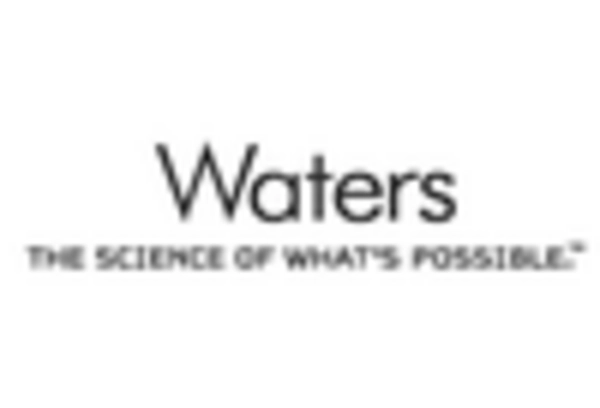Growth in Environmental Testing
Environmental testing is gaining traction in the GCC, driven by increasing awareness of environmental issues and regulatory requirements. The liquid chromatography-instruments market is poised to benefit from this trend, as these instruments are crucial for analyzing pollutants and contaminants in various matrices, including water, soil, and air. The GCC countries are implementing stricter environmental regulations, which necessitate the use of advanced analytical techniques to monitor compliance. The market for environmental testing is expected to grow significantly, with estimates suggesting a CAGR of around 6% in the coming years. This growth is likely to create substantial opportunities for liquid chromatography instruments, as they are integral to ensuring environmental safety and sustainability.
Expansion of Food and Beverage Testing
The food and beverage industry in the GCC is expanding rapidly, driven by population growth and changing consumer preferences. This expansion is creating a heightened demand for quality assurance and safety testing, which is a key driver for the liquid chromatography-instruments market. Liquid chromatography is essential for detecting contaminants, additives, and nutritional content in food products. As regulatory bodies impose stricter safety standards, the need for reliable analytical methods becomes increasingly critical. The food testing market is projected to grow at a CAGR of approximately 5% in the coming years, indicating a robust opportunity for liquid chromatography instruments to play a vital role in ensuring food safety and compliance.
Rising Demand in Pharmaceutical Sector
The pharmaceutical sector in the GCC is experiencing a notable surge, which appears to be a primary driver for the liquid chromatography-instruments market. As the region invests heavily in healthcare infrastructure, the need for advanced analytical techniques to ensure drug safety and efficacy is paramount. The market for pharmaceuticals in the GCC is projected to grow at a CAGR of approximately 7% over the next few years. This growth necessitates the adoption of sophisticated liquid chromatography instruments for quality control and research purposes, thereby enhancing the market's expansion. Furthermore, the increasing focus on biopharmaceuticals and personalized medicine is likely to further propel the demand for these instruments, as they are essential for the analysis of complex biological samples.
Technological Innovations in Instrumentation
Technological innovations are transforming the liquid chromatography-instruments market, particularly in the GCC region. The introduction of high-resolution and ultra-fast liquid chromatography systems is enhancing the efficiency and accuracy of analyses. These advancements allow for the separation of complex mixtures in shorter time frames, which is increasingly important in fast-paced research and industrial environments. Moreover, the integration of automation and data management systems is streamlining workflows, making it easier for laboratories to handle large volumes of samples. As the demand for high-throughput analysis continues to rise, the liquid chromatography-instruments market is likely to see increased adoption of these innovative technologies, thereby driving growth and improving analytical capabilities.
Increased Investment in Research and Development
Investment in research and development (R&D) within the GCC is on the rise, which is expected to positively impact the liquid chromatography-instruments market. Governments and private entities are allocating substantial funds to enhance scientific research, particularly in fields such as pharmaceuticals, biotechnology, and environmental science. This focus on R&D is likely to create a demand for advanced analytical instruments, including liquid chromatography systems, to support various research initiatives. The GCC's commitment to fostering innovation and scientific excellence suggests that the market for liquid chromatography instruments will continue to expand as researchers seek cutting-edge technologies to facilitate their work.

















